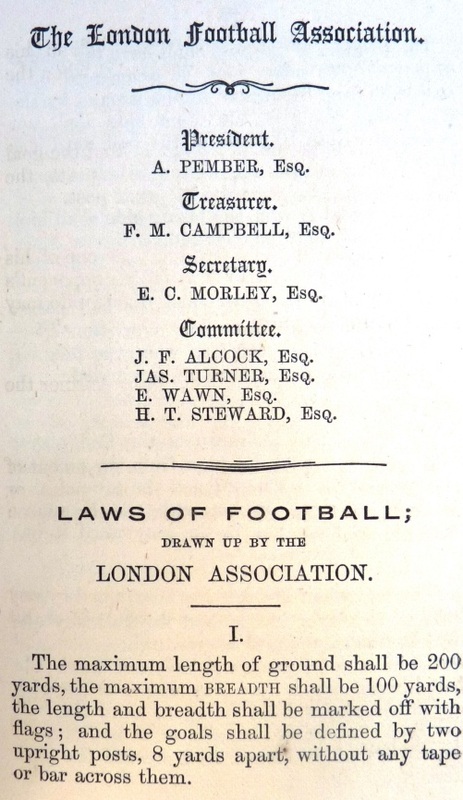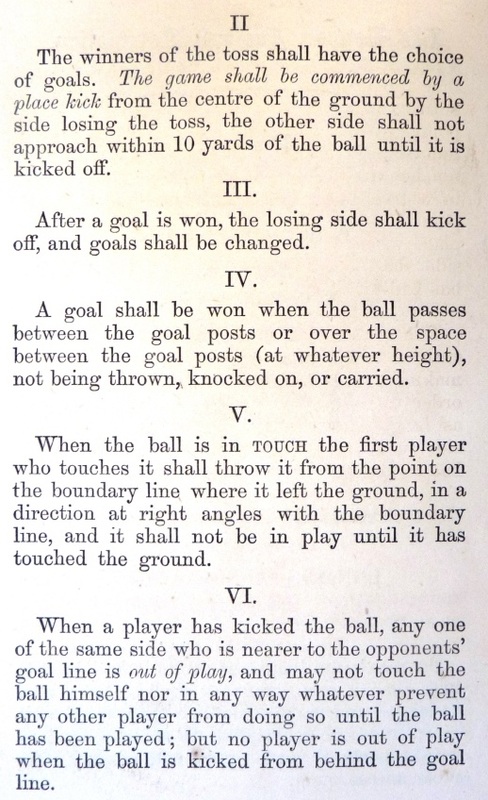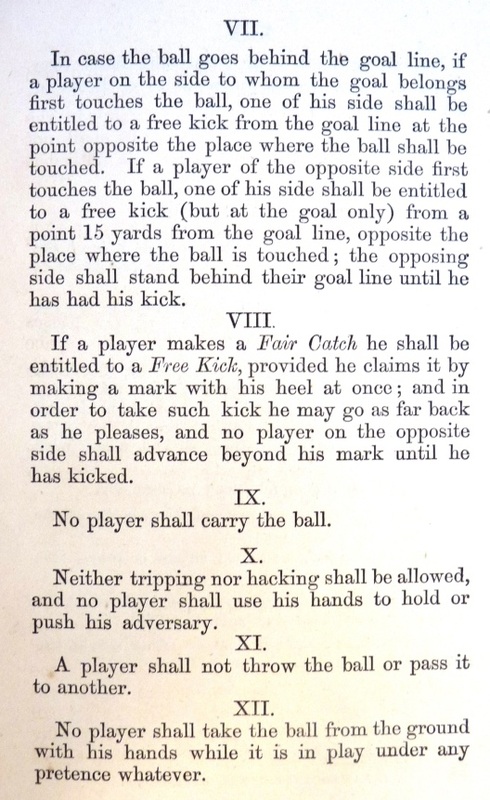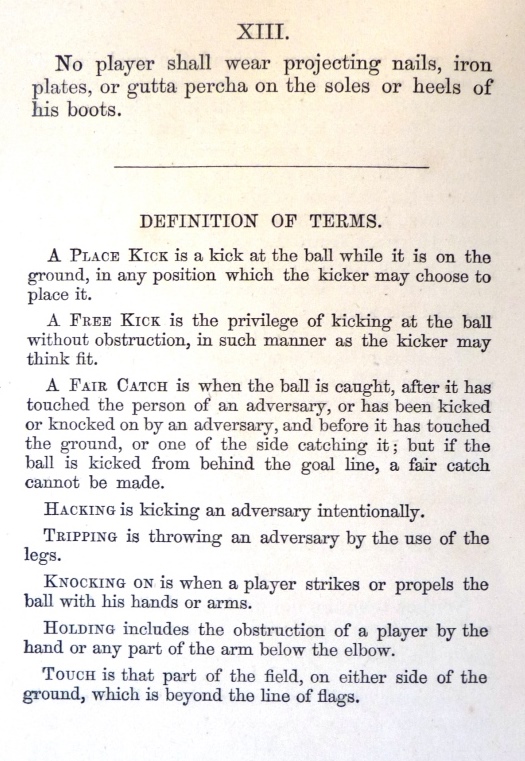The identities of all 43 founders of football are published here for the first time, after intensive research, and can now be given the recognition they deserve for creating the world’s greatest sport.
A few are well known, but most are obscure individuals who did little in the game apart from their willingness to take part in this debate. Three were chosen as office bearers at the first meeting: A Pember (President), EC Morley (Hon Secretary), FM Campbell (Hon Treasurer). Four additional committee members were added at the sixth meeting: GT Wawn, J Turner, HT Steward and JF Alcock.
There are fascinating stories, triumphs and tragedies which can only be touched on here but provide plenty of material for further research. As revealed in my previous blogs, the influences on football ranged from Scotland to Australia, and while the players were solidly middle class they represented a wide variety of professions and backgrounds.
A few question marks remain – some of which may never be resolved – and I would welcome any additional information. However, I am reasonably confident in my conclusions: for example, Blackheath had a player reported as H Poynder in meeting 6, but the only player of that surname at the club was Alfred Poynder.
Forest School sent two representatives to meeting 5, listed as J Morgan and J Bouch, but both had left the school by then and the former’s full name was David John Morgan; but he did go on to play for Wanderers so was a player of some consequence. As an aside, Forest School make the claim that a player called H Tubb sat on the first FA committee, but in fact Henry Tubb was captain of football in 1867/68, and thereafter went to Rugby School.
Most intriguingly, Wimbledon School’s representative at meetings 4, 5 and 6 was reported as AE Daltry in the press and in the handwritten minutes. With no corresponding name at the school, I suspect this is a mis-reading of AE Duthy; however there was a Dealtry at Wimbledon, but with initials HTC (Hugh Thornton Cunninghame).
By the sixth meeting, 12 clubs and seven schools had paid their guinea membership fee to join the FA. Eight clubs were from the London area: Barnes, NN Kilburn, Forest, Crystal Palace, War Office, Surbiton, Crusaders and Blackheath, and they were joined by four others who had heard about the meetings through the press: Lincoln, Aldershot, Royal Engineers (Chatham), and Sheffield FC. The schools were Blackheath Proprietary School, Perceval House, Forest School (Walthamstow), Wimbledon School, Kensington School, Royal Naval School (New Cross) and Uppingham.
These, then, are the founders of association football.
No Names, Kilburn
Arthur Pember
Born Lambeth, Surrey, 15 January 1835; died LaMoure, North Dakota, USA, 3 April 1886.
The son of a stockbroker, the captain of NN Kilburn was first president of the FA. He emigrated to the USA in the mid-1860s and pursued a career as an investigative journalist before his early death.
George Lawson
Born Pitminster, Somerset, 30 January 1838; died London 9 March 1898.
Educated at Elizabeth College (Guernsey) and Marlborough College (1854-55). Played for NNs, Crusaders and Civil Service in the early 1860s. He joined the Civil Service in 1856 as a Clerk in War Department, rising to become Assistant Under Secretary of State for War in 1895, and was knighted to become Sir George Lawson KCB in 1897.
Barnes
Ebenezer Cobb Morley
Born Hull, 16 August 1831; died Richmond, Surrey, 20 November 1924.
A driving force behind the founding meetings of the FA, Morley was FA secretary for three years, then president until 1874. Brought up in Hull, he moved to Barnes as a young man and lived there for the rest of his life. A solicitor, he was keen rower and helped found the Barnes and Mortlake Regatta as well as Barnes FC.
Thomas Dyson Gregory
Born Wakefield, Yorkshire, 19 July 1835; died Camberwell, Jan-Mar 1908.
A corn merchant in partnership with his brothers Frederick and George. A founder of Barnes FC in 1862, he was also on the committee of London Rowing Club (along with EC Morley and RW Willis) and treasurer of the Barnes and Mortlake regatta.
Blackheath
Francis Maule Campbell
Born Blackheath, Kent, 1843 (christened 1 September 1843); died Reigate, 30 December 1920.
Elected treasurer of the FA at its first meeting, he took the rugby-playing schools out of membership after the sixth meeting and had no further involvement. Was also a founder of the Rugby Football Union in 1871. Initially entering the wine trade like his father, he became a merchant of continental produce. Married twice, first in 1902 aged 58, and the second time just three months before his death.
Frederick Henry Moore
Born Guildford, Western Australia 1839; died Hobart, Tasmania, 2 April 1934.
One of the founders of the Blackheath club, he came to London as a 14-year-old to go to school at Blackheath, then worked as a wine merchant in the city with Dalgety and Co, his uncle’s company. In 1864 returned to the southern hemisphere where he was an insurance agent and company director in New Zealand, Tasmania and Sydney.
John Whitaker Cooper
Born London, 12 February 1842; died Earls Court, London, 13 August 1902.
A banker with Brown, Janson & Co, which later merged with Lloyds Bank. Had ten children, nine of them girls.
Lorne Augustus Campbell
Born Great Malvern, Worcs, 2 July 1842; died Lausanne, Switzerland, 14 June 1893.
Educated at Rugby (1855-61), and Trinity College Cambridge. Joined the Indian Civil Service in 1863 and ten years later was appointed Under Secretary to the Government Revenue Department. His uncle, the Duke of Argyll, was Secretary of State for India.
Alfred Poynder
Born Barming Heath, Maidstone 5 December 1839; died Blackheath, 27 September 1906.
Private schools then Caius College, Cambridge, 1858-62. Graduated BA, qualified as a solicitor in 1866 and practised in London. Son of George Poynder, surgeon.
War Office
George Twizell Wawn
Born West Boldon, Co Durham, Apr-Jun 1840; died Newquay, Devon, 17 April 1914.
Won a scholarship to Durham University and on graduating in 1859 with an MA he moved to London to work for the War Office as a Clerk. He had rowed for his university and joined London Rowing Club, as well as playing football for several teams. He joined the African commissariat in 1873, with postings to Sierra Leone and Ghana, retiring in 1889 with the honorary rank of Major.
Charles Frederick Hawker
Born Abbeville, France, 3 July 1821; died Easthampstead, Berkshire, 3 April 1902.
The oldest man to attend any of the founding meetings, he had been at Charterhouse 1833-1838, where he played in the cricket XI. He joined the Civil Service in 1838, initially in the Ordnance Department and latterly in the War Office, retiring in 1865. He was a Major in the War Office Company of the 2nd Middlesex Rifle Volunteers. In 1860 he inspired a colleague, Guy Pym, to form the Civil Service Athletic Association by promoting a sports meeting for War Office staff. The son of Lt.-Gen. Sir Samuel Hawker, an aide to King George III.
George Mariette
Born Paris, France, 20 May 1837; died Budleigh Salterton, Devon, 25 April 1925.
Originally George Mariette de Villeblin, son of a French father and English mother. When his father died in 1838 the family moved to England, and he became a naturalised British Subject in 1850. Went to Eton 1844-50, and worked as a Clerk in the War Office until retiring in 1881. Described as ‘oarsman, fisherman, boxer and a very good amateur actor’; the Mariette family papers are held at the University of Exeter.
Horace William Gray
Born Brompton, Middlesex, March 1843; died South Kensington, 19 February 1923.
Bradfield College 1853-59 (cricket XI for five years). Joined the War Office in 1862 as a Clerk, stayed until 1880. Also served in 2nd Middlesex Rifle Volunteer Corps, retiring in 1902 as honorary colonel.
Crusaders
Herbert Thomas Steward
Born Westminster, 9 November 1838; died Henley, 9 September 1915.
Educated at Westminster School, he was an architect and surveyor. His primary passion was rowing and he was president of Leander Rowing Club, and wrote the history of Henley Regatta.
Forest FC (Leytonstone)
John Forster Alcock
Born Bishop Wearmouth, Durham (christened 14 April 1841); died Berkhamsted, Herts, 31 March 1910.
After the family moved from Durham to London in the 1850s, he had three years at Harrow, and continued to play football as a pioneering member of Forest FC. He followed his father’s profession as a ship owner and broker. Older brother of Charles Alcock.
Alfred Westwood Mackenzie
Born Leytonstone, 24 May 1840; died Acton, Middlesex, 6 April 1924.
Insurance Manager with Guardian Assurance, with his brother Sir Morell Mackenzie he was one of the founders of the Throat Hospital in London. Attended the FA’s jubilee dinner in 1913 and presented with a silver casket.
Cowper Donne Jackson
Born Blackheath, Kent, 1839; died Camberwell, Surrey, Oct-Dec 1900.
A Mechanical Engineer, known from his initials as ‘Seedy’, he was a Member of the Honorable Artillery Company of London. Married in the British Embassy in Paris, 1868.
Crystal Palace
Francis Day
Born Westerham, Kent, Feb/March 1838; died London, 12 March 1886.
Owner of the Black Eagle Brewery in Bermondsey, succeeding his father as a partner in the company of Day Noakes & Co, together with another Crystal Palace player, Wickham Noakes. Frank Day was also a fast bowler for West Kent. Left £58,000 in his will.
James Turner
Born Croydon, Surrey, 6 December 1839; died Eastbourne, 27 July 1922.
A Crystal Palace player throughout the 1860s right up to the first FA Cup tournament, he was FA treasurer 1864-68. Educated at Streatham Academy, he was a wine merchant and was son of the first President of the Royal College of Veterinary Surgeons.
Henry Lloyd
Born Camberwell, Surrey, 24 July 1841; died at sea, 30 January 1869.
From a family of Crystal Palace players, brother of Theodore, his sister Rachel married James Turner. He was a shipping insurance agent in his short life.
Theodore Lloyd
Born Bewdley, Worcestershire, 7 September 1834; died Croydon, Surrey, 15 June 1904.
Elder brother of Henry, he was referee of the England v Scotland match in 1873. A stockbroker.
Frederick Urwick
Born Clapham, Surrey, 14 July 1842; died Hampstead, London, 30 November 1915.
A wine merchant in London, he also composed a patriotic song, the Union Jack.
John Louis Siordet
Born Clapham, Surrey, 10 May 1839; died Bradford upon Avon, Wiltshire, 24 April 1882.
From a Swiss family which had settled in England, he was an indigo merchant.
Lawrence Vivian Desborough
Born Beckenham, Kent, 4 December 1844; died Port Said, Egypt, 11 October 1892.
An accountant, for a time he ran an agency in Southbridge, New Zealand, then was manager of the Equitable Life Assurance Co office in Bombay. He died in Egypt, en route for England.
Surbiton
Theodore Bell
Born Uppingham, Rutland, 30 July 1840; died Epsom, Surrey, 7 November 1923.
Educated at Uppingham, where he was captain of football 1857-58. Although he represented the short-lived Surbiton club at the first meeting of the FA and signed them up for membership, he was better known as a rower and was for many years the secretary of Kingston Rowing Club. A solicitor, he established a legal practice in Epsom and London. He was Clerk to Justices in Epsom, and also to the Commissioners of Taxes.
Charterhouse
Bertram Fulke Hartshorne
Born Cogenhoe, Northants, 26 October 1844; died Water Eaton, Oxfordshire, 31 December 1921.
The only public school representative at the first meeting (which was on his 19th birthday). After leaving Charterhouse, he took his degree at Pembroke College, Oxford, qualified as a barrister, joined the Indian Civil Service in Ceylon, then returned to England as a District Auditor for the Local Government Board.
Perceval House School
George William Shillingford
Born Purneah, Bengal , 4 October 1844; died Kolassy, Bengal, 27 July 1896.
Born on the family estate in Bengal which grew indigo plants, he was sent to Perceval House, a private school in Blackheath run by Edinburgh-born William Kieser MA (1819-1911). Returning home after his education, he and his brothers were responsible for hunting Bengal tigers almost to extinction. Purneah is now called Purnia in the northern Indian state of Bihar.
Arthur Christian Tawke
Born Norfolk 6 April 1847; died Claremont, South Africa, 4 July 1927.
A career soldier, he went to Royal Military College and served in the 32nd Regiment, the Duke of Cornwall’s Light Infantry, retiring as Lieutenant Colonel. Lived in South Africa until his death.
Alexander Rose Stenning
Born Godstone, Surrey, 9 February 1846; died Kensington, 22 April 1928.
Educated at Chatham House, Ramsgate, and at Blackheath. An architect, he was President of the Surveyors Institution 1909-10, magistrate for Sussex and was knighted.
Walter Russell Langton Brackenbury
Born Madras, India, 1845; died Dorking, Surrey, 18 March 1880.
The only son of Walter Charles Brackenbury (who had been court martialled in Madras in 1851, and went to New Zealand). A soldier with the 20th Regiment of Foot from 1864-69, then a land surveyor and valuer.
Kensington School
William John Mackintosh
Born Calcutta, 14 July 1845; died Honiton, Devon, 16 November 1923.
Born in Bengal where his Scottish father Alexander was a merchant, he was educated at Elgin Academy, Edinburgh Academy (1856-59), Kensington School and a military ‘crammer’ in Kensington Square which got him into the Royal Military Academy. A career soldier, he won a commission with the Royal Artillery in 1867, but there is no evidence he ever saw action in 20 years’ service before he retired with the honorary rank of Lt Colonel. He lived out his days in Devon, where he served as a JP.
Lewis McIver
Born Eddrachillis, Sutherland, 6 March 1846; died London, 9 August 1920.
Born in remote north-west Scotland where his father was factor to the Duke of Sutherland. After Kensington School he went to Bonn University, joined the Indian Civil Service, and was called to the bar in 1878. First elected to parliament in 1885 as Liberal member for Torquay, he lost his seat after a year but was elected for Edinburgh West 1895-1909. Created a baronet in 1896, he was caricatured in Vanity Fair as the ‘member for Scotland’.
Jasper Alexander Redgrave
Born Kensington, London 23 November 1845; died Birmingham, 21 November 1909.
Inspector of Factories for the Midlands, and author of works on industrial safety.
Eyre Burton Powell
Born Madras, India, 1847; died Penzance, Cornwall, 3 August 1923.
From an Irish family, after school he went to Dublin University, where he got his BA. He qualified as a barrister in Ireland in 1870.
Blackheath Proprietary School
William Henry Gordon
Born Edinburgh, 30 March 1845; died Toronto, Ontario, 1 January 1929.
Educated at Edinburgh Academy (1854-59), Cheltenham College (1859-60), Blackheath Proprietary School (1860-64), then Trinity College, Cambridg, graduating with a BA in 1868. After he qualified as a barrister in 1870, he changed his surname to Lockhart Gordon and emigrated to Canada where he was a lawyer and director of the Canadian Land and Emigration Company.
Thomas Percy Fox
Born Balham, Surrey, 23 May 1846; died Chislehurst, Kent, 20 October 1918.
Educated at Elizabeth College (Guernsey) then Blackheath Proprietary School (1861-63). Entered the East India trade and worked in Calcutta until 1880, when he returned to London as a wine merchant.
John Barwick Sams
Born Grafton Regis, Northamptonshire, 31 January 1847; died Denver, Colorado, 16 March 1895.
Son of a minister, he joined the Royal Navy in 1868 in the Paymasters Division, but in 1873 was dismissed from the service. Worked in Ireland as a steward for Walter Bourke, who was assassinated in 1882, then went to Denver, Colorado, where he worked as an investments adviser.
Royal Naval School (New Cross)
Ferdinand Brand
Born Leigh, Essex 28 March 1846; died Kew, Surrey, 19 April 1922.
Son of a Navy captain who fought at Trafalgar, he was educated at Royal Naval School, and joined the Civil Service in 1867 as a Clerk in the Admiralty. Edited the Navy List 1880-98, and was Admiralty Librarian 1898-1908.
William Pears Johnston
Born Cawnpore, India, 17 April 1847; died Darjeeling, India, 15 April 1889.
Son of Charles Cornwallis Johnston, a Major in the Royal Engineers, he joined the Indian Telegraph Department, part of the Civil Service. Published a number of telegraphic innovations before his early death.
Wimbledon School
Archibald Edward Duthy
Born Sudborough, Northamptonshire, 4 January 1846; died Sudborough, 10 November 1906.
Winchester College (1859-62), Wimbledon (1862-63) and the Royal Military Academy, Woolwich. Commissioned in the Royal Artillery, he had an eventful career that included the Afghan War of 1879 and the North West Frontier campaign of 1897-98, retiring as Colonel in 1898. Played cricket for various teams including I Zingari.
Fletcher Hayes Grant Cruickshank
Born Ootacamund, India, 10 December 1846; died Chelmsford, Essex, 20 January 1912.
A Captain in the Royal Horse Artillery, he retired through ill health in 1881 and became a stockbroker with the prestigious Cazenove firm.
Forest School
David John Morgan
Born Leytonstone, Essex, 25 April 1844; died Brentwood, Essex, 28 February 1917.
Educated at Forest School and at Vevey, Switzerland, he played football for Wanderers. Worked for his father as a Russian merchant in London, and as a company director. Served as Conservative MP for Walthamstow 1900-06.
John Bouch
Born Dulwich, 13 October 1844; died Hemsworth, Yorkshire, 9 April 1926.
A clothing wholesaler of Surbiton, he took over as head of the firm from his father until it went bankrupt in 1902. Strong family football connections: his sister Jane married FA Cup winner Morton Peto Betts, while brothers William and Alfred (also at Forest School) both played for Crystal Palace.




 RSS Feed
RSS Feed